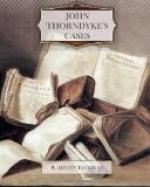“I think I have seen all that I wanted to see,” he said, as he pocketed the box and took up his hat. “We shall meet to-morrow morning at the inquest.” He shook hands with Hart, and we went out into the relatively pure air.
On one pretext or another, Thorndyke lingered about the neighbourhood of Aldgate until a church bell struck six, when he bent his steps towards Harrow Alley. Through the narrow, winding passage he walked, slowly and with a thoughtful mien, along Little Somerset Street and out into Mansell Street, until just on the stroke of a quarter-past we found ourselves opposite the little tobacconist’s shop.
Thorndyke glanced at his watch and halted, looking keenly up the street. A moment later he hastily took from his pocket the cardboard box, from which he extracted the two mounted photographs which had puzzled me so much. They now seemed to puzzle Thorndyke equally, to judge by his expression, for he held them close to his eyes, scrutinizing them with an anxious frown, and backing by degrees into the doorway at the side of the tobacconist’s. At this moment I became aware of a man who, as he approached, seemed to eye my friend with some curiosity and more disfavour; a very short, burly young man, apparently a foreign Jew, whose face, naturally sinister and unprepossessing, was further disfigured by the marks of smallpox.
“Excuse me,” he said brusquely, pushing past Thorndyke; “I live here.”
“I am sorry,” responded Thorndyke. He moved aside, and then suddenly asked: “By the way, I suppose you do not by any chance understand Yiddish?”
“Why do you ask?” the newcomer demanded gruffly.
“Because I have just had these two photographs of lettering given to me. One is in Greek, I think, and one in Yiddish, but I have forgotten which is which.” He held out the two cards to the stranger, who took them from him, and looked at them with scowling curiosity.
“This one is Yiddish,” said he, raising his right hand, “and this other is Russian, not Greek.” He held out the two cards to Thorndyke, who took them from him, holding them carefully by the edges as before.
“I am greatly obliged to you for your kind assistance,” said Thorndyke; but before he had time to finish his thanks, the man had entered, by means of his latchkey, and slammed the door.
Thorndyke carefully slid the photographs back into their grooves, replaced the box in his pocket, and made an entry in his notebook.
“That,” said he, “finishes my labours, with the exception of a small experiment which I can perform at home. By the way, I picked up a morsel of evidence that Davidson had overlooked. He will be annoyed, and I am not very fond of scoring off a colleague; but he is too uncivil for me to communicate with.”
* * * * *




